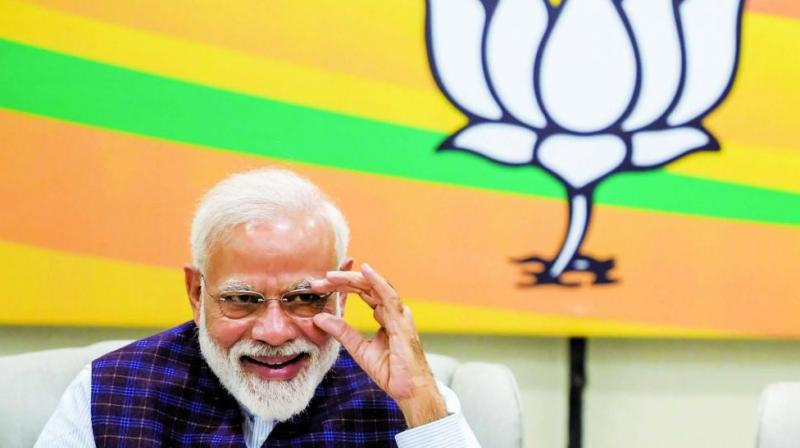A zero sum game of ‘sabka saath’

The latest modified version of ‘Sabka Saath Sabka Vikas’ with an added ‘Sabka Vishwas’ is the new point of demand. Does the newly sworn-in Prime Minister of India mean what he says is the first question being asked. In a Lok Sabha where the Prime Minister’s party has not brought in a single Muslim member, where Christian, Sikh and Parsi representation is quite low, where the BJP does not have much of a claim in south India, will these invocations translate into anything in reality, a set of political observers with their misgivings ask.
My first bafflement about the new slogan is not based on performative contradictions. It is one of nomenclature. In the victory speech made at the BJP programme held on May 23 Mr Modi said that “secularism” has died out completely. But when the motto ‘Sabka Saath Sabka Vikas Sabka Vishwas’ comes up, isn’t it the same thing as “secularism” — expanded in Hindi? This is a theoretical confusion.
As for the need to have Muslims to represent Muslims, or Christians to represent Christians themselves, though this has been a salient feature of India’s compound nationalism merging various regional, religious and linguistic identities — what the writer Mukul Kesavan famously called ‘Noah’s Arc nationalism’ with a pair representing the whole species — this is not an issue that rattled India through its history. A Buddhist Asoka had a Hindu majority people to rule, Muslim kings have ruled over Hindu majorities and Hindu kings were monarchs of Muslim majority princiely states and so on. Unlike in the West, where the religion/sect of the king had also to be the religion/sect of his people, India never had such unification on religious lines in the last 2,000 years. Thus lack of MPs from all groups as a microcosm of the nation isn’t a preliminary condition for diversity.
Is there no problem with minimal representation of Muslims and others in Parliament, then? I think there is. It is based on the interesting fact that the one Muslim BJP minister in the newly announced ministry is Rajya Sabha member. The BJP ran a campaign that attempted to create a dangerous, monstrous other in Muslims.
In such a campaign, by arguing for a strong saviour, they were instilling an inferiority complex in the minds of the Hindu community (or building on such fears and anxieties) and infantalising them. In order to do this, they needed an enormous threat which they invented in the Muslim community. This grammar of campaign disabled them from fielding any winning Muslim candidate. Now they might want to proclaim inclusivism but they had emptied out the very space through a belligerent campaign, based on social antagonism. I don’t want to make the mistake of evaluating the statement by its intention but the insecurity and the anxiety the campaign generated is quite difficult to dissipate or reverse.
In the first five years of the BJP government, we have seen the weakening of India’s state machinery and constitutional promises in the form of lynching and other mob crimes. To be with everybody, gaining the faith of all Indians, for the growth of everyone is an absolute basic requirement of any government of the Republic of India but it can’t be a post-victory posturing without any social or public foundation. It should have been nurtured through the procedures of democracy. The Frankenstein’s monsters of revenge and power are all too powerful to be even contained later.
Though this election was primarily about Mr Modi, it was fought on supporting and opposing him, it could be asked whether his statement shouldn’t be able to change the entire paradigm. Many BJP MPs might have won because the votes were for Mr Modi but now that they are elected, each of them is a member of Parliament. The elections might have been converted into a Presidential mode, through media work and propaganda machinery, but the Indian democratic set-up doesn’t work so. It values each of the MPs separately for a number of practical reasons, especially on the ground. So, this turnaround, this reversal, this new policy, if it has to mean anything, should become an actualisable project for all these representatives. Does the BJP have the willpower to get this done and make sure criminal collectives do not weaken the governance or the country they are in charge of?
The task of inclusiveness rests hugely with the democratically elected. Their not wanting to do so is against the very foundations of the Republic. Their inability in this demonstrates their weakness. A campaign used to find their way to power is the biggest hurdle in the whole enterprise.
Now, what if the BJP only wants all these for Hindus? What if there is no point in taking this long-winded route to understanding their commitment to the people of India?
If they mean all Hindus, rich and poor, upper castes and lower castes, men and women and from all regions, they have to seriously think of socialism in economic terms.
What the BJP has presented as Hindu issues are all symbolic issues around “Hindu pride,” not socio-economic issues that plague the majority of the Hindu community. Even for that, they have to get out of the labyrinth of aestheticisatoin of politics, filled with spectacles concretised around a single personality.
If the future of the people of India or the future of a particular sect of Indians is a concern, the BJP finds itself in the need to break the idol of rhetoric they themselves have concocted. In that sense, the BJP’s ethical political journey can only begin in their undoing of this electoral victory of social antagonisms.
(The writer works with St Stephens, College Delhi)

